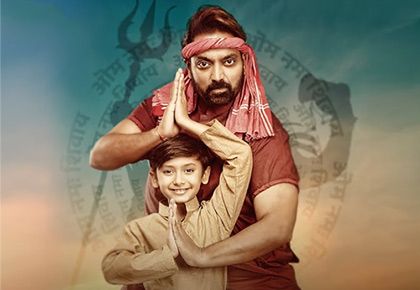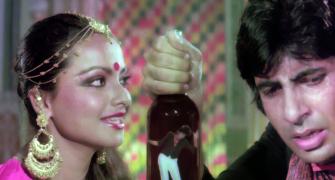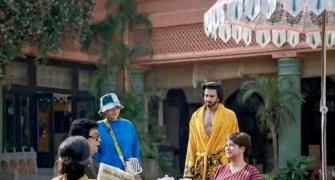A film that calls itself Dehati Disco can't be taken seriously, says Deepa Gahlot.

There is a saying used in many Hindi films -- even a broken clock shows the correct time twice a day. So even the worst film can unwittingly make a valid and topical point.
Like Dehati Disco, directed by Manoj Sharma, and starring the wonderful choreographer Ganesh Acharya, shouts its anti-caste stance several times, before moving to a Har Har Mahadev-chanting agenda.
A prologue, voiced by Akshay Kumar, talks of hidden talent all over India and the need to find it, but the film (co-written by Sharma and Acharya) is not India's Got Talent in disguise.
Which is a pity, because then it would have had a purpose of some kind.
In a dance film, it is clear right at the start, that there will be a competition at some point, and the winner can be predicted too.
But the father-son dancing duo in this film -- Bhola (Acharya) and Bheema (Saksham Sharma) -- dance to save the village temple, not to unearth talent, though the kid is a Super Dance Chapter 3. The tyke can act too, which is more than what can be said about the collection of hams around him.
The village of Shivpur, in Uttar Pradesh, forbids dancing, because the Mahant (Manoj Joshi) says so.
He had driven his own son out of the house and the village for daring to shake a leg.
The son is adopted by a milkman, grows up to be one too, and returns to the village with his son, only to be driven out again, because they dance in the temple square and the panchayat banishes them.
This time, they get shelter with a potter.
A Mahant's son doing low-caste jobs makes a point about 'insaniyat' (humanity) to his son.
Like in films of the yesteryears -- of which Manoj Kumar was the torchbearer -- the local MLA's (Rajesh Sharma) son 'Don't call me Jaikishan' Jack, returns from 'London-Umrika' (like they are neighbouring countries) after winning some dance reality show, and wants to teach the natives to breakdance.
The father, instigated by a guru with an axe to grind with the Mahant, lands up in Shivpur and insists that Jack's dance school will be built right where the Shiv temple stands.
The Mahant is aghast, even though his other son Radhe (Ravi Kishen) is a partner of the MLA, the villagers are up in arms and it boils down to the question: Who will stand up to Jack in a dance competition? Little Bheema pipes up: I will.
If Jack wins, the temple goes. If he loses (how can a London-Umrika conquering lad lose?), the MLA packs up.
The Mahant is all tearful and contrite.
Radhe is nervous because he is in a no-win corner.
The villagers prance around Bhola and Bheema, who dance in the field to the title number using a strange holding-tummy-and-hopping step.
Remo D'Souza is summoned to judge the dance off.
It's no spoiler who wins.
The music composer is Sivamani, so there are a lot of percussion beats, perhaps because they go well with Ganesh Acharya and Saksham Sharma's rustic dancing.
Acharya, who taught a lot of Bollywood men (and some women too) how to dance, has a mobile face, but he doesn't speak. He shouts. So do most of the other men.
Women are largely ignored, this is an all-male ensemble, not surprising in a state noted for its patriarchy.
And what's equally strange, is that there isn't even a token Muslim in sight, like there used to be in the old films from which this one takes its inspiration and decibel level.
The good thing is that a film that calls itself Dehati Disco cannot be taken seriously!
An extra half star for Master Saksham and a line that rails against 'sankuchit rudhiwad' (narrow conservatism) of the upper caste way of life.











